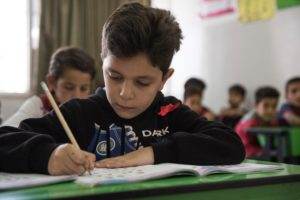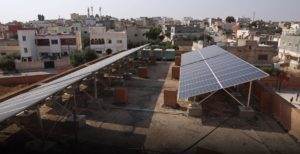EnergyPress release
Jordan presented an interesting challenge as the refugee population targeted were based in urban centers, living in towns and rented accommodation rather than the traditional camp setting. This inspired innovative approaches to bring solar water heating, solar photovoltaic (PV) systems, energy efficiency upgrades, and training opportunities for Syrian refugees and the Jordanian communities hosting them, living in and around Irbid in the north of the country.
Shelter respondent

© UNHCR/Hannah Maule-ffinch
Installed solar water heaters in 572 households where refugees are living as tenants and completed energy efficiency upgrades in 123 of those households, reaching more than 3,400 individuals.
School Principal

© UNHCR/Hannah Maule-ffinch
Contributed to a stronger enabling environment for the adoption of renewable energy services for refugees
Laura Clarke, RE4R Project Manager, Practical Action said “Collaboration between partners has been key to the success of this project, and the achievements have been made possible by the organisations’ openness, appetite for learning and determination to ensure lasting improvements to the quality of life of refugees.”
“Overall, the project offers insightful learning and evidence to shape future renewable energy programmes and ensure that sustainable energy is accessible for all, including refugees.”
Government of Jordan representative
Notes for Editors
Practical Action is an international development organisation that puts ingenious ideas to work so people in poverty can change their world.
Practical Action helps people find solutions to some of the world’s toughest problems. Challenges made worse by climate change and gender inequality. It works with communities to develop ingenious, lasting and locally owned solutions for agriculture, water and waste management, climate resilience and clean energy. And it shares what works with others, so answers that start small can grow big.
Practical Action consists of a UK registered charity with community projects in Africa, Asia and Latin America, an independent publishing company and a technical consulting service. It combines these specialisms to multiply its impact and help shape a world that works better for everyone.